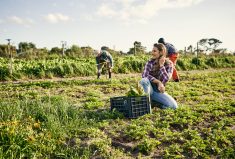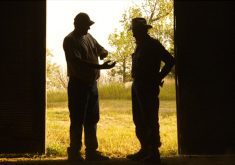For over two years, I’ve had the pleasure of reading and reviewing fascinating books for Country Guide. It’s been amazing, but it raises the question. Does it make sense for you to actually read a book, or would you and your farm be so much better off if you did real work instead?
In other words, when I reflect on the books I’ve read over the past two years, despite everything I’ve gotten out of them, I wonder, why would you do it? If you’re a reader now, and you regularly read business and professional development books, how do you justify the time and effort?
Equally importantly, how do you do it?
Read Also

Farm & Family – Feb 27 edition
Last week, we highlighted part one of a two-part series by GFM associate digital editor Geralyn Wichers about why you…
How do you make time to read? How do you choose what to read? And what, specifically, do you do during reading sessions to help you retain what you’ve read?
Let’s also be sure we ask the opposite questions too. For those who don’t read regularly, why not? What are your constraints? Is it time? Is it that you’re not sure what to read, or what you can expect to get out of it, if anything? Or are you not sure you’ll retain what you’ve read.
Does it just seem more urgent for you to take care of other business-related tasks?
To sum it up, should reading books be part of a businessperson’s life — and if so, how? Or should you be happy just to flip through the digital stream on your phone? Would that do you as much good? Hmm … that’s a tough question. How would we ever answer it?
The “why” of reading
Charlie Munger, billionaire business partner to Warren Buffet, said “In my whole life, I have known no wise people … who didn’t read all the time — none, zero.”
Farming takes everything. There are mountains of daily tasks and decisions. When everything runs along well-worn grooves, things become so automatic that we forget about searching out different perspectives and ideas. But developing competence and expertise in your domain is key to getting where you want to go.
One of the best ways to do that is to read. Reading “allows you to master the best of what other people have already figured out,” writes Shane Parish on the Farnam Street blog. Like interest on cash in the bank, you don’t have to do much to garner the benefits of accumulating a positive balance in your knowledge bank. Just soak in the dos and don’ts of those who have “been there, done that” and withdraw and apply their wisdom to your situation when needed.
Reading not only helps you accumulate knowledge and build skills through osmosis, but also helps you to flesh out half-formed thoughts or opinions. As business owners know, sound, fact-based decisions come from being exposed to a variety of perspectives and solutions.
Farming is one industry where you can’t be complacent. In order for your business to thrive, you must remain up-to-date on markets, technology, policies and other business-building insights. “As all genuine experts know, the complexities of any given field are enormous. There’s always more to learn,” says Clive Thompson, Canadian freelance journalist and blogger.
Reading not only helps you navigate complexities inherent in running a farm business, but by virtue of the knowledge bank deposits you’re making, you’ll also make fewer mistakes in future.
How to read and remember what you’ve read
First, understand why you’re reading a book or article. “You have to have some idea of what you want to get from the book,” says Parish. “If you don’t read with intention, what you read will never stick. If you are looking for business insights, read for that.”
To retain what you’re reading, you need to focus, so remove distractions like your phone, TV, noisy people, etc. Another trick to help you remember information is to actively make connections between the new content you’re reading and stuff you already know.
Think critically as you read and practice synoptical reading. This means reading a variety of books and articles on the same subject to help you ferret out and evaluate contrasting viewpoints.
There was a time when I would never commit the sacrilege of writing notes or doing any underlining in a book, but taking notes while reading (whether in the margins or on a separate sheet of paper or phone app) significantly improves recall of material. So, highlight, underline and give yourself over to the pleasure of marginalia. Then compile those notes in one place once you’re done reading the book. (I’ll tell you why in a minute.)
There’s no need to tell a farmer that time is valuable, so here are two tricks to help you work in some reading everyday. First, set yourself a daily page quota, for example five, 10 or 25 pages a day. The effect is cumulative; a few pages a day and you’ll have a book read in no time.
Second, always have a book close by. Stash one in the tractor for unloading/loading wait times or download one on your phone so it’s on tap if you’re waiting for an appointment or for a cow to calf.
And be realistic. Time is money, so feel free to skim and dump. Skim through a few chapters or read the first 50 or so pages. Then, if it doesn’t look like the book is going to provide any value, dump it and move on.
What to do with the things you’ve read
The point of reading to acquire knowledge is not to collect a bunch of random information that sits around in your brain getting dusty. And there is such a thing as overdoing it.
Arthur Schopenhauer, a 19th century German philosopher, said, “To desire that a man should retain everything he has ever read is the same as wishing him to retain in his stomach all that he has ever eaten.”
Parish argues there’s a critical difference between reading for information and reading for understanding.
“How you read makes a massive difference to knowledge accumulation,” he says. “To get the most out of each book we read, it is vital to have a plan for recording, reflecting on, and putting into action the conclusions we draw from the information we consume.”
If you can, put your margin notes together in a Word document (or the Notes function on your phone) and compile those documents in a binder or file on your laptop so that you can refer to them when you’re stumped about a problem or when you’re looking for inspiration. This will become an extremely valuable resource over the years as you add to your customized mini-reference library.
Francis Bacon, a 16th century philosopher, said, “Some books are to be tasted, others to be swallowed, and some few to be chewed and digested.” It’s important to choose reading material wisely, but also to extract value from what you read and retain it for future use.
















